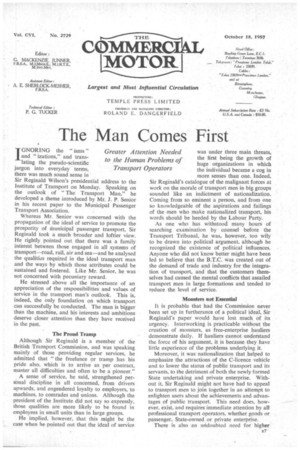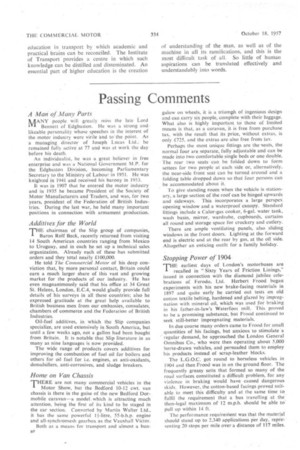The Man Comes First
Page 41

Page 42

If you've noticed an error in this article please click here to report it so we can fix it.
IGNORING the " isms " and " izations," and translating the pseudo-scientific jargon into everyday terms, there was much sound sense in Sir Reginald Wilson's presidential address to the Institute of Transport on Monday. Speaking on the outlook of "The Transport Man," he developed a theme introduced by Mr. J. P. Senior in his recent paper to the Municipal Passenger Transport Association.
Whereas Mr. Senior was concerned with the propagation of the ideal of service to promote the prosperity of Municipal passenger transport, Sir Reginald took a much broader and loftier view. He rightly pointed out that there was a family interest between those engaged in all systems of transport—road, rail, air and sea—and he analysed the qualities required in the ideal transport man and the ways by which those attributes could be sustained and fostered. Like Mr. Senior, he was not concerned with pecuniary reward.
He stressed above all the importance of an appreciation of the responsibilities and values of service in the transport man's outlook. This is, indeed, the only foundation on which transport can successfully be conducted. The man is bigger than the machine, and his interests and ambitions deserve closer attention than they have received in the past.
The Proud Tramp Although Sir Reginald is a member of the British Transport Commission, and was speaking mainly of those providing regular services, he admitted that "the freelance or tramp has his pride also, which is to arrive as per contract, master all difficulties and often to be a pioneer."
A sense of service, he said, strengthened per sonal discipline in all concerned, from drivers upwards, and engendered loyalty to employers, to machines, to comrades and unions. Although the president of the Institute did not say so expressly, those qualities are more likely to be found in employees in small units than in large groups.
He implied, however, that this might be the case when he pointed out that the ideal of service was under three main threats, the first being the growth of huge organizations in which the individual became a cog in more senses than one. Indeed, Sir Reginald's catalogue of the malignant forces at work on the morale of transport men in big groups sounded like an indictment of nationalization. Coming from so eminent a person, and from one so knowledgeable of the aspirations and failings of the men who make nationalized transport, his words should be heeded by the Labour Party.
As one who has withstood many hours of searching examination by counsel before the Transport Tribunal, he was, however, too wily to be drawn into political argument, although he recognized the existence of political influences. Anyone who did not know better might have been led to believe that the B.T.C. was created out of the demand of trade and industry for the integration of transport, and that the customers themselves had caused the mental conflicts that assailed transport men in large formations and tended to reduce the level of service.
Monsters not Essential It is probable that had the Commission never been set up in furtherance of a political ideal, Sir Reginald's paper would have lost much of its urgency. Interworking is practicable without the creation of monsters, as free-enterprise hauliers demonstrate daily. If hauliers cannot understand the force of his argument, it is because they have little experience of the problems underlying it.
Moreover, it was nationalization that helped to emphasize the attractions of the C-licence vehicle and to lower the status of public transport and its servants, to the detriment of both the newly formed State undertaking and private enterprise. Without it, Sir Reginald might not have had to appeal to transport men to join together in an attempt to enlighten users about the achievements and advantages of public transport. This need does, however. exist, and requires immediate attention by all professional transport operators, whether goods or passenger, State-owned or private enterprise.
There is also an undoubted need for higher B7, education in transport by which academic and practical brains can be reconciled. The Institute of Transport provides a centre in which such knowledge can be distilled and disseminated. An essential part of higher education is the creation of understanding of the man, as well as of the machine in all its ramifications, and this is the most difficult task of -all. So little of human aspirations can be translated effectively and understandably into words.




















































































































